Classes | |
| struct | AllOptions |
| struct | BaseModelOptions |
| struct | Binding |
| class | Bindings |
| struct | BuildOptions |
| struct | DeviceAllocator |
| struct | DeviceDeallocator |
| struct | HostAllocator |
| struct | HostDeallocator |
| struct | InferenceEnvironment |
| struct | InferenceOptions |
| struct | InferenceTime |
| Measurement times in milliseconds. More... | |
| struct | InferenceTrace |
| Measurement points in milliseconds. More... | |
| struct | LayerProfile |
| Layer profile information. More... | |
| class | Logger |
| Class which manages logging of TensorRT tools and samples. More... | |
| class | LogStreamConsumer |
| Convenience object used to facilitate use of C++ stream syntax when logging messages. Order of base classes is LogStreamConsumerBase and then std::ostream. This is because the LogStreamConsumerBase class is used to initialize the LogStreamConsumerBuffer member field in LogStreamConsumer and then the address of the buffer is passed to std::ostream. This is necessary to prevent the address of an uninitialized buffer from being passed to std::ostream. Please do not change the order of the parent classes. More... | |
| class | LogStreamConsumerBase |
| Convenience object used to initialize LogStreamConsumerBuffer before std::ostream in LogStreamConsumer. More... | |
| class | LogStreamConsumerBuffer |
| class | MirroredBuffer |
| Coupled host and device buffers. More... | |
| struct | ModelOptions |
| struct | Options |
| struct | Parser |
| class | Profiler |
| Collect per-layer profile information, assuming times are reported in the same order. More... | |
| struct | ReportingOptions |
| struct | SystemOptions |
| class | TrtCudaBuffer |
| Managed buffer for host and device. More... | |
| class | TrtCudaEvent |
| Managed CUDA event. More... | |
| class | TrtCudaGraph |
| Managed CUDA graph. More... | |
| class | TrtCudaStream |
| Managed CUDA stream. More... | |
| struct | TrtDestroyer |
| struct | UffInput |
Typedefs | |
| using | Severity = nvinfer1::ILogger::Severity |
| using | TrtDeviceBuffer = TrtCudaBuffer< DeviceAllocator, DeviceDeallocator > |
| using | TrtHostBuffer = TrtCudaBuffer< HostAllocator, HostDeallocator > |
| using | Arguments = std::unordered_multimap< std::string, std::string > |
| using | IOFormat = std::pair< nvinfer1::DataType, nvinfer1::TensorFormats > |
| using | ShapeRange = std::array< std::vector< int >, nvinfer1::EnumMax< nvinfer1::OptProfileSelector >()> |
| template<typename T > | |
| using | TrtUniquePtr = std::unique_ptr< T, TrtDestroyer< T > > |
Enumerations | |
| enum | ModelFormat { ModelFormat::kANY, ModelFormat::kCAFFE, ModelFormat::kONNX, ModelFormat::kUFF } |
Functions | |
| void | setReportableSeverity (Logger::Severity severity) |
| void | cudaCheck (cudaError_t ret, std::ostream &err=std::cerr) |
| void | setCudaDevice (int device, std::ostream &os) |
| Parser | modelToNetwork (const ModelOptions &model, nvinfer1::INetworkDefinition &network, std::ostream &err) |
| Generate a network definition for a given model. More... | |
| ICudaEngine * | networkToEngine (const BuildOptions &build, const SystemOptions &sys, nvinfer1::IBuilder &builder, nvinfer1::INetworkDefinition &network, std::ostream &err) |
| Create an engine for a network defintion. More... | |
| ICudaEngine * | modelToEngine (const ModelOptions &model, const BuildOptions &build, const SystemOptions &sys, std::ostream &err) |
| Create an engine for a given model. More... | |
| void | dumpRefittable (nvinfer1::ICudaEngine &engine) |
| Log refittable layers and weights of a refittable engine. More... | |
| ICudaEngine * | loadEngine (const std::string &engine, int DLACore, std::ostream &err) |
| Load a serialized engine. More... | |
| bool | saveEngine (const nvinfer1::ICudaEngine &engine, const std::string &fileName, std::ostream &err) |
| Save an engine into a file. More... | |
| TrtUniquePtr< nvinfer1::ICudaEngine > | getEngine (const ModelOptions &model, const BuildOptions &build, const SystemOptions &sys, std::ostream &err) |
| Create an engine from model or serialized file, and optionally save engine. More... | |
| bool | setUpInference (InferenceEnvironment &iEnv, const InferenceOptions &inference) |
| Set up contexts and bindings for inference. More... | |
| void | runInference (const InferenceOptions &inference, InferenceEnvironment &iEnv, int device, std::vector< InferenceTrace > &trace) |
| Run inference and collect timing. More... | |
| Arguments | argsToArgumentsMap (int argc, char *argv[]) |
| bool | parseHelp (Arguments &arguments) |
| std::ostream & | operator<< (std::ostream &os, const BaseModelOptions &options) |
| std::ostream & | operator<< (std::ostream &os, const UffInput &input) |
| std::ostream & | operator<< (std::ostream &os, const ModelOptions &options) |
| std::ostream & | operator<< (std::ostream &os, const IOFormat &format) |
| std::ostream & | operator<< (std::ostream &os, const ShapeRange &dims) |
| std::ostream & | operator<< (std::ostream &os, const BuildOptions &options) |
| std::ostream & | operator<< (std::ostream &os, const SystemOptions &options) |
| std::ostream & | operator<< (std::ostream &os, const InferenceOptions &options) |
| std::ostream & | operator<< (std::ostream &os, const ReportingOptions &options) |
| std::ostream & | operator<< (std::ostream &os, const AllOptions &options) |
| void | helpHelp (std::ostream &os) |
| void | printProlog (int warmups, int timings, float warmupMs, float walltime, std::ostream &os) |
| Print benchmarking time and number of traces collected. More... | |
| void | printTiming (const std::vector< InferenceTime > &timings, int runsPerAvg, std::ostream &os) |
| Print a timing trace. More... | |
| void | printEpilog (std::vector< InferenceTime > timings, float walltimeMs, float percentile, int queries, std::ostream &os) |
| void | printPerformanceReport (const std::vector< InferenceTrace > &trace, const ReportingOptions &reporting, float warmupMs, int queries, std::ostream &os) |
| Print and summarize a timing trace. More... | |
| void | exportJSONTrace (const std::vector< InferenceTrace > &trace, const std::string &fileName) |
| Printed format: [ value, ...] value ::= { "start enq : time, "end enq" : time, "start in" : time, "end in" : time, "start compute" : time, "end compute" : time,
"start out" : time, "in" : time, "compute" : time, "out" : time, "latency" : time, "end to end" : time}. More... | |
| void | dumpInputs (const nvinfer1::IExecutionContext &context, const Bindings &bindings, std::ostream &os) |
| Print input tensors to stream. More... | |
| void | dumpOutputs (const nvinfer1::IExecutionContext &context, const Bindings &bindings, std::ostream &os) |
| Print output tensors to stream. More... | |
| void | exportJSONOutput (const nvinfer1::IExecutionContext &context, const Bindings &bindings, const std::string &fileName) |
| Export output tensors to JSON file. More... | |
| InferenceTime | operator+ (const InferenceTime &a, const InferenceTime &b) |
| InferenceTime | operator+= (InferenceTime &a, const InferenceTime &b) |
| void | printEpilog (std::vector< InferenceTime > timings, float percentile, int queries, std::ostream &os) |
| Print the performance summary of a trace. More... | |
| int | dataTypeSize (nvinfer1::DataType dataType) |
| template<typename T > | |
| T | roundUp (T m, T n) |
| int | volume (const nvinfer1::Dims &d) |
| int | volume (const nvinfer1::Dims &dims, const nvinfer1::Dims &strides, int vecDim, int comps, int batch) |
| int | volume (nvinfer1::Dims dims, int vecDim, int comps, int batch) |
| std::ostream & | operator<< (std::ostream &os, const nvinfer1::Dims &dims) |
| std::ostream & | operator<< (std::ostream &os, const std::vector< int > &vec) |
| std::ostream & | operator<< (std::ostream &os, const nvinfer1::WeightsRole role) |
| nvinfer1::Dims | toDims (const std::vector< int > &vec) |
| template<typename T > | |
| void | fillBuffer (void *buffer, int volume, T min, T max) |
| template<typename H > | |
| void | fillBufferHalf (void *buffer, int volume, H min, H max) |
| template<> | |
| void | fillBuffer< half_float::half > (void *buffer, int volume, half_float::half min, half_float::half max) |
| template<typename T > | |
| void | dumpBuffer (const void *buffer, int volume, const std::string &separator, std::ostream &os) |
| bool | broadcastIOFormats (const std::vector< IOFormat > &formats, size_t nbBindings, bool isInput=true) |
Variables | |
| Logger | gLogger {Logger::Severity::kINFO} |
| LogStreamConsumer | gLogVerbose {LOG_VERBOSE(gLogger)} |
| LogStreamConsumer | gLogInfo {LOG_INFO(gLogger)} |
| LogStreamConsumer | gLogWarning {LOG_WARN(gLogger)} |
| LogStreamConsumer | gLogError {LOG_ERROR(gLogger)} |
| LogStreamConsumer | gLogFatal {LOG_FATAL(gLogger)} |
| constexpr int | defaultMaxBatch {1} |
| constexpr int | defaultWorkspace {16} |
| constexpr int | defaultMinTiming {1} |
| constexpr int | defaultAvgTiming {8} |
| constexpr int | defaultDevice {0} |
| constexpr int | defaultBatch {1} |
| constexpr int | defaultStreams {1} |
| constexpr int | defaultIterations {10} |
| constexpr int | defaultWarmUp {200} |
| constexpr int | defaultDuration {3} |
| constexpr int | defaultSleep {0} |
| constexpr int | defaultAvgRuns {10} |
| constexpr float | defaultPercentile {99} |
| using sample::Severity = typedef nvinfer1::ILogger::Severity |
| using sample::TrtDeviceBuffer = typedef TrtCudaBuffer<DeviceAllocator, DeviceDeallocator> |
| using sample::TrtHostBuffer = typedef TrtCudaBuffer<HostAllocator, HostDeallocator> |
| using sample::Arguments = typedef std::unordered_multimap<std::string, std::string> |
| using sample::IOFormat = typedef std::pair<nvinfer1::DataType, nvinfer1::TensorFormats> |
| using sample::ShapeRange = typedef std::array<std::vector<int>, nvinfer1::EnumMax<nvinfer1::OptProfileSelector>()> |
| using sample::TrtUniquePtr = typedef std::unique_ptr<T, TrtDestroyer<T> > |
|
strong |
| void sample::setReportableSeverity | ( | Logger::Severity | severity | ) |

|
inline |

|
inline |

| Parser sample::modelToNetwork | ( | const ModelOptions & | model, |
| nvinfer1::INetworkDefinition & | network, | ||
| std::ostream & | err | ||
| ) |
Generate a network definition for a given model.


| nvinfer1::ICudaEngine * sample::networkToEngine | ( | const BuildOptions & | build, |
| const SystemOptions & | sys, | ||
| nvinfer1::IBuilder & | builder, | ||
| nvinfer1::INetworkDefinition & | network, | ||
| std::ostream & | err | ||
| ) |
Create an engine for a network defintion.
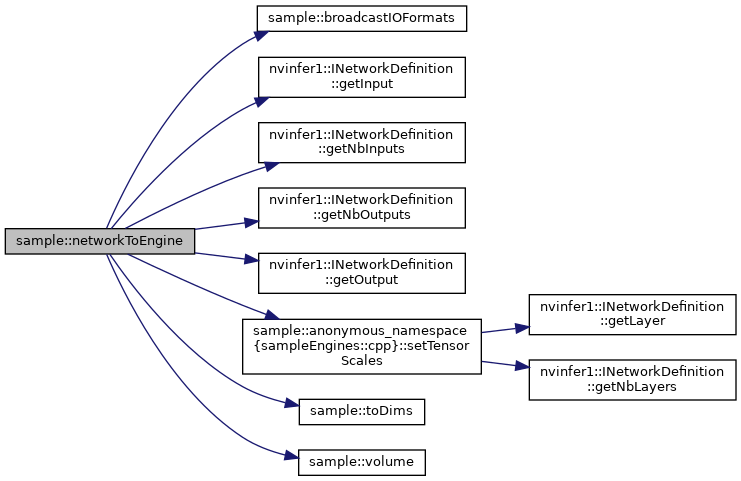

| nvinfer1::ICudaEngine * sample::modelToEngine | ( | const ModelOptions & | model, |
| const BuildOptions & | build, | ||
| const SystemOptions & | sys, | ||
| std::ostream & | err | ||
| ) |
Create an engine for a given model.
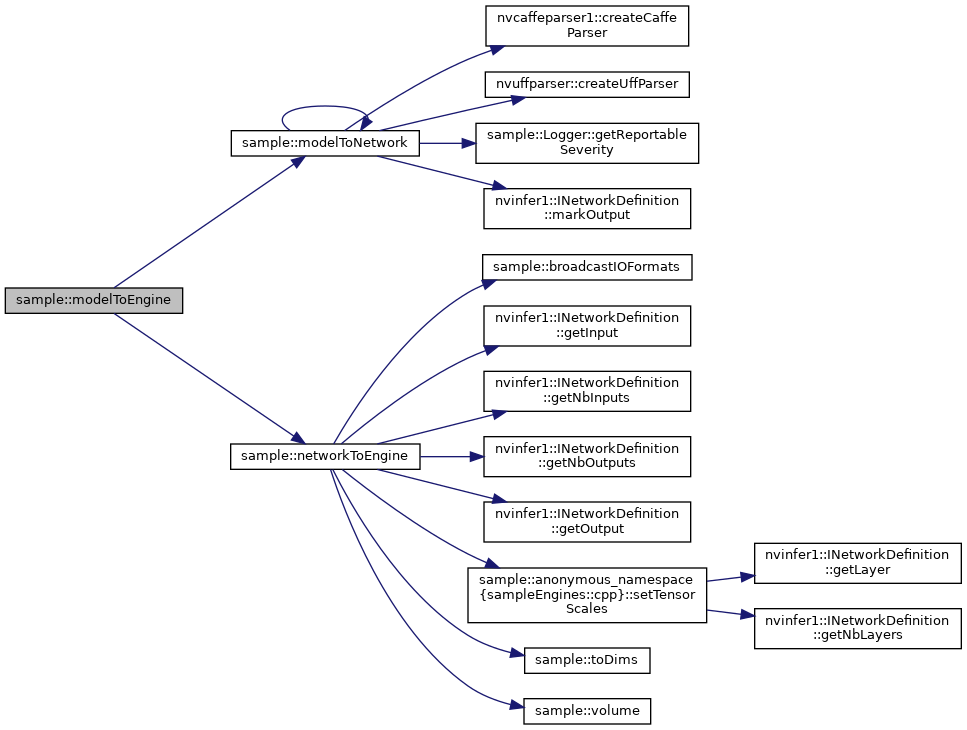

| void sample::dumpRefittable | ( | nvinfer1::ICudaEngine & | engine | ) |
Log refittable layers and weights of a refittable engine.

| nvinfer1::ICudaEngine * sample::loadEngine | ( | const std::string & | engine, |
| int | DLACore, | ||
| std::ostream & | err | ||
| ) |
Load a serialized engine.


| bool sample::saveEngine | ( | const nvinfer1::ICudaEngine & | engine, |
| const std::string & | fileName, | ||
| std::ostream & | err | ||
| ) |
Save an engine into a file.


| TrtUniquePtr< nvinfer1::ICudaEngine > sample::getEngine | ( | const ModelOptions & | model, |
| const BuildOptions & | build, | ||
| const SystemOptions & | sys, | ||
| std::ostream & | err | ||
| ) |
Create an engine from model or serialized file, and optionally save engine.
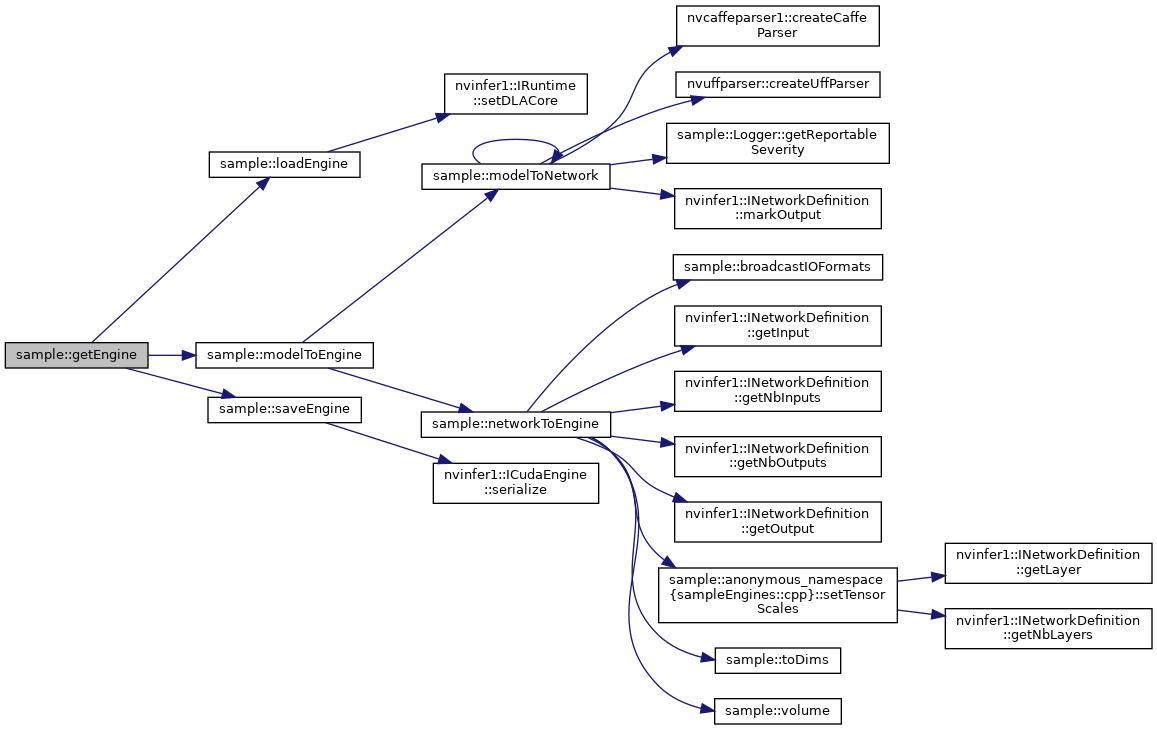
| bool sample::setUpInference | ( | InferenceEnvironment & | iEnv, |
| const InferenceOptions & | inference | ||
| ) |
Set up contexts and bindings for inference.

| void sample::runInference | ( | const InferenceOptions & | inference, |
| InferenceEnvironment & | iEnv, | ||
| int | device, | ||
| std::vector< InferenceTrace > & | trace | ||
| ) |
Run inference and collect timing.
| bool sample::parseHelp | ( | Arguments & | arguments | ) |

| std::ostream & sample::operator<< | ( | std::ostream & | os, |
| const BaseModelOptions & | options | ||
| ) |
| std::ostream & sample::operator<< | ( | std::ostream & | os, |
| const UffInput & | input | ||
| ) |
| std::ostream & sample::operator<< | ( | std::ostream & | os, |
| const ModelOptions & | options | ||
| ) |
| std::ostream & sample::operator<< | ( | std::ostream & | os, |
| const IOFormat & | format | ||
| ) |
| std::ostream & sample::operator<< | ( | std::ostream & | os, |
| const ShapeRange & | dims | ||
| ) |
| std::ostream & sample::operator<< | ( | std::ostream & | os, |
| const BuildOptions & | options | ||
| ) |
| std::ostream & sample::operator<< | ( | std::ostream & | os, |
| const SystemOptions & | options | ||
| ) |
| std::ostream & sample::operator<< | ( | std::ostream & | os, |
| const InferenceOptions & | options | ||
| ) |
| std::ostream & sample::operator<< | ( | std::ostream & | os, |
| const ReportingOptions & | options | ||
| ) |
| std::ostream & sample::operator<< | ( | std::ostream & | os, |
| const AllOptions & | options | ||
| ) |
| void sample::helpHelp | ( | std::ostream & | os | ) |


| void sample::printProlog | ( | int | warmups, |
| int | timings, | ||
| float | warmupMs, | ||
| float | benchTimeMs, | ||
| std::ostream & | os | ||
| ) |
Print benchmarking time and number of traces collected.


| void sample::printTiming | ( | const std::vector< InferenceTime > & | timings, |
| int | runsPerAvg, | ||
| std::ostream & | os | ||
| ) |
Print a timing trace.


| void sample::printEpilog | ( | std::vector< InferenceTime > | timings, |
| float | walltimeMs, | ||
| float | percentile, | ||
| int | queries, | ||
| std::ostream & | os | ||
| ) |


| void sample::printPerformanceReport | ( | const std::vector< InferenceTrace > & | trace, |
| const ReportingOptions & | reporting, | ||
| float | warmupMs, | ||
| int | queries, | ||
| std::ostream & | os | ||
| ) |
Print and summarize a timing trace.
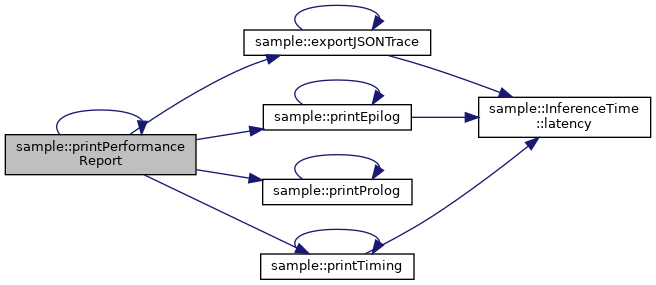

| void sample::exportJSONTrace | ( | const std::vector< InferenceTrace > & | trace, |
| const std::string & | fileName | ||
| ) |
Printed format: [ value, ...] value ::= { "start enq : time, "end enq" : time, "start in" : time, "end in" : time, "start compute" : time, "end compute" : time, "start out" : time, "in" : time, "compute" : time, "out" : time, "latency" : time, "end to end" : time}.
Export a timing trace to JSON file.


| void sample::dumpInputs | ( | const nvinfer1::IExecutionContext & | context, |
| const Bindings & | bindings, | ||
| std::ostream & | os | ||
| ) |
Print input tensors to stream.


| void sample::dumpOutputs | ( | const nvinfer1::IExecutionContext & | context, |
| const Bindings & | bindings, | ||
| std::ostream & | os | ||
| ) |
Print output tensors to stream.


| void sample::exportJSONOutput | ( | const nvinfer1::IExecutionContext & | context, |
| const Bindings & | bindings, | ||
| const std::string & | fileName | ||
| ) |
Export output tensors to JSON file.


|
inline |
|
inline |
| void sample::printEpilog | ( | std::vector< InferenceTime > | timings, |
| float | percentile, | ||
| int | queries, | ||
| std::ostream & | os | ||
| ) |
Print the performance summary of a trace.
|
inline |

|
inline |

|
inline |
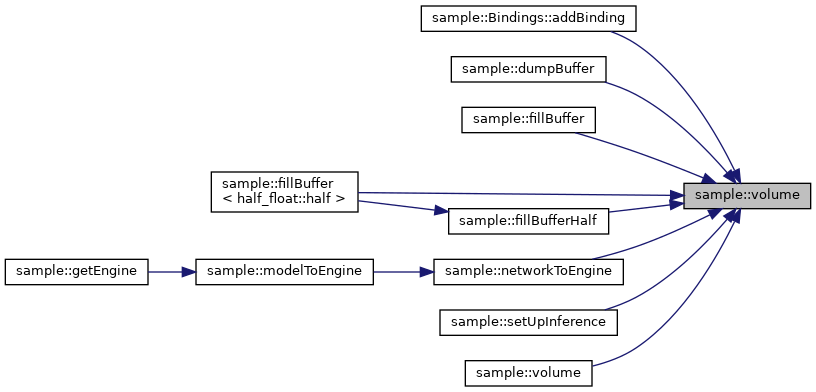
|
inline |

|
inline |

|
inline |
|
inline |
|
inline |
|
inline |

|
inline |

|
inline |


|
inline |

|
inline |

|
inline |

| Logger sample::gLogger {Logger::Severity::kINFO} |
| LogStreamConsumer sample::gLogVerbose {LOG_VERBOSE(gLogger)} |
| LogStreamConsumer sample::gLogInfo {LOG_INFO(gLogger)} |
| LogStreamConsumer sample::gLogWarning {LOG_WARN(gLogger)} |
| LogStreamConsumer sample::gLogError {LOG_ERROR(gLogger)} |
| LogStreamConsumer sample::gLogFatal {LOG_FATAL(gLogger)} |
|
constexpr |
|
constexpr |
|
constexpr |
|
constexpr |
|
constexpr |
|
constexpr |
|
constexpr |
|
constexpr |
|
constexpr |
|
constexpr |
|
constexpr |
|
constexpr |
|
constexpr |